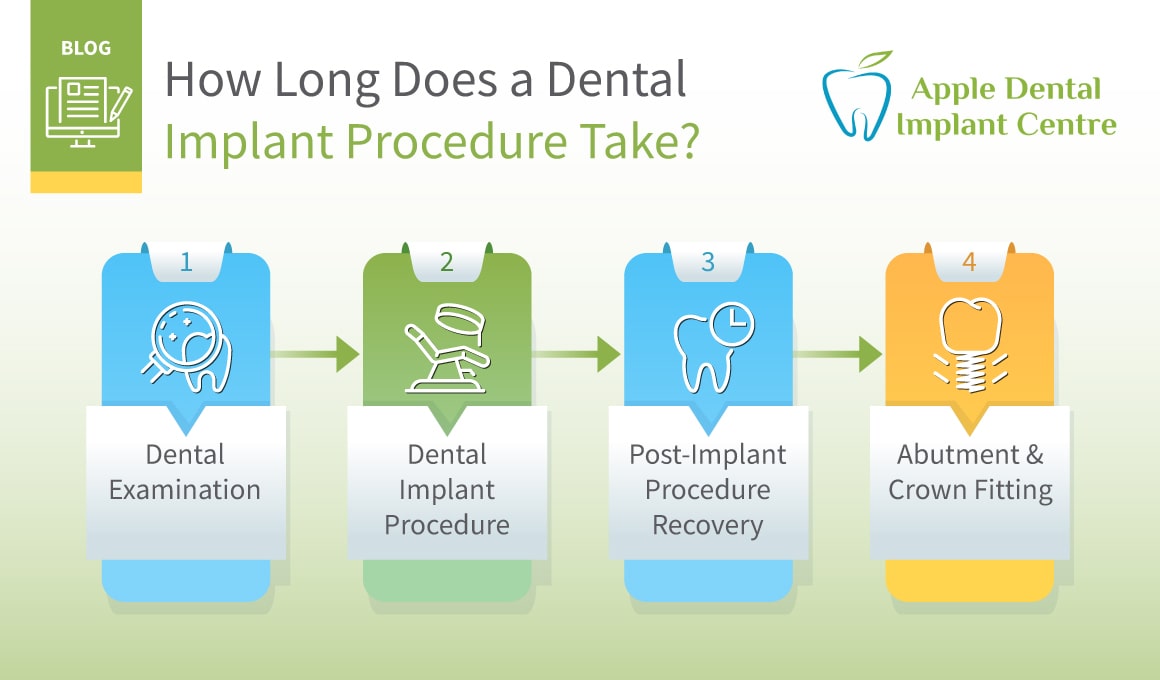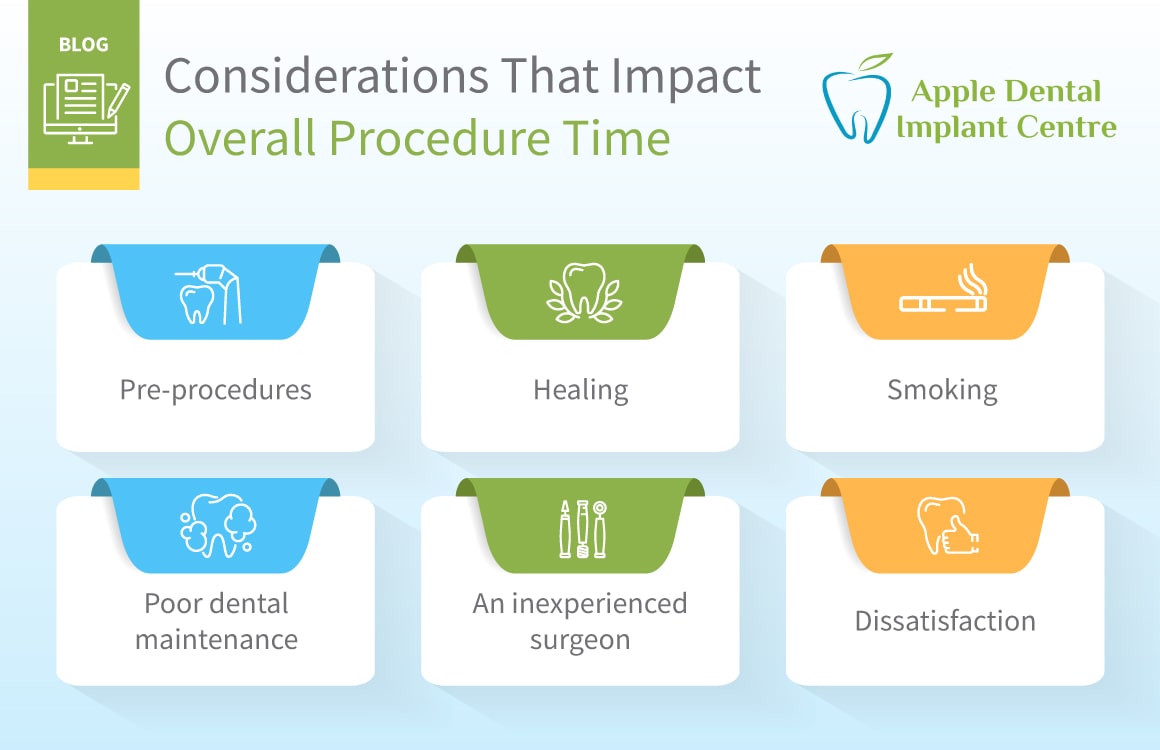Share this
How Long Does a Dental Implant Procedure Take? Explained By Experts
by Apple Dental Implant Centre on (April 03, 2023)
Dental implants offer the ultimate tooth replacement solution. Natural-looking single-tooth, multiple-tooth, or All-on-X (All-on-Four) replacements are permanently affixed to your jaw using titanium posts placed in the bone. The post bonds with the bone, acting like a natural tooth root. However, because dental implants involve several steps, they are a lot more involved than your average dental treatment.
Although other treatments might require a few visits, the dental implant procedure is unique as it not only requires four stages but also includes extended recovery times. As a result, it can take from five to eight months before the entire procedure is complete. Sounds like a long time? Fear not. We’ve put together a very comprehensive overview of the stages involved to explain how long a dental implant procedure takes. Every situation is unique, so book a consultation today to learn how long the procedure may take for you.

Step 1: Dental Examination
At your initial dental examination your implant dentist assesses your general and oral health to determine if you are an ideal candidate for dental implants. An ideal candidate has adequate gum, dental and bone health to support the tooth implants. At this stage, your dentist will review your dental charts and discuss health issues to determine whether you require any “pre-procedures” when they develop a treatment plan. These procedures might include the following:
- Bone Grafting: If your dentist determines your jaw bone has degenerated, they will recommend a bone graft procedure. This is commonly required if you either have advanced gum disease, or your tooth has been missing for an extended period. If your jawbone is not substantial enough, it won’t support the implants. Therefore, your dentist will “rebuild” the jaw using bone grafting before implants can be placed. If you require bone grafts, you can add three to four months to your dental implant procedure to allow your jawbone to heal.
- Gum treatments: If you have gum disease, treatment to overcome the infection as well as to repair the gums is required. Depending on the level of infection and damage to the gum tissue, periodontal treatments can add as little as a few weeks and up to a few months to prepare your gums for your implant procedure.
- Tooth extractions: If your implant is intended to replace a tooth that can’t be saved, the tooth will have to be extracted. This can add an additional three to four weeks, or in some cases longer, to allow the soft tissue to heal.
General health considerations would include conditions such as diabetes and immune deficiencies that can slow down the healing process or compromise your ability to heal completely. If you are pregnant, your dentist (and gynecologist) will likely recommend you book your dental implant procedure after your child arrives.
Step 2: Dental Implant Procedure
At Step 2 of the dental implant process, your dentist makes an incision in your gums and then drills small holes in your jawbone where they will place your posts. The “biocompatible” posts must fuse to the jawbone through a natural process called “osseointegration.” The dental implant procedure is usually performed in one day.
Step 3: Post-Implant Procedure Recovery
The healing process post-dental implant placement includes small incisions and osseointegration. While the incisions typically only take about two weeks to heal, it can take from two to nine months for the jawbone and post to fuse together and become stable enough to support your artificial tooth.
Step 4: Abutment & Crown Fitting
Your dentist will reopen your gums to place the abutment onto the post. The abutment is exposed above the gum, providing the screw they will use to affix the artificial tooth. Following the placement of your abutments, your gums will need more time to heal than the initial incisions. This is because the abutment sits above the gum line, making the area more vulnerable and sensitive. As a result, it can take from two weeks to a month for your gums to heal at this stage. If all goes well at this stage, your dentist can insert your new teeth.
As your gums heal, your new artificial tooth is fabricated at an offsite laboratory. If the timing is right, your healing aligns with the completion of your crowns. Otherwise, it can take another two weeks for the teeth to be crafted. Your dentist will assess your gums, bone, and implants to confirm everything has healed properly before they schedule your final appointment to affix your teeth to the abutment.

From start to finish: How long will the implant procedure take?
Because every patient is unique, the success and procedure time can vary drastically. However, if you have the average procedure without pre-procedures you are looking at between four to six months. With pre-procedures that number can extend from six months to two years or more. Some considerations that impact overall procedure time include:
- Pre-procedures: If you require the full gamut of pre-procedures, this can add up to eight to 12 months to the overall procedure time.
- Healing: If you tend to be a slow healer, this can add a few weeks or more to the timing.
- Post-operative care: Not following the care instructions after each stage of the procedure can negatively impact your healing, as well as the integrity of the posts. You can encounter issues ranging from infection to osseointegration failure.
- Smoking: Smoking can slow down healing time, which again adds days or weeks to the procedure.
- Poor dental maintenance: If you generally tend to follow a less-than-perfect dental hygiene regime, this can cause issues, including the recurrence of gum disease. If you develop an infection, it will require treatment before your dentist can proceed with the next stages.
- An inexperienced surgeon: If a dentist fails to develop a treatment plan based on your personal needs or has less experience performing dental implant procedures, this can add time to your treatment because it increases the risk of complications that impact healing. An experienced surgeon like those found at Apple Dental understands what is required to ensure the implants offer proper support. They also take all necessary steps to reduce the risk of mishaps, such as iatrogenic trauma resulting from serious injury to your gum tissue.
- Dissatisfaction: If you are dissatisfied with the appearance of your new teeth, adjustments or even recrafting of the teeth is required. Because it takes an average of two weeks to fabricate artificial teeth, this adds time to the procedure.
Does the dental implant procedure differ in Canada vs USA?
No. The dental implant procedure follows the same steps and stages in both countries. Canada and the USA both adhere to very strict rules in patient care. This ensures your procedure is likely to be successful as long as you follow your dentist’s instructions. However, where you might see a difference is in the price. In Canada, U.S. patients benefit from the USD versus CAD value. As a result, even if you see a dentist offering the same price tag, you’ll be paying less thanks to the conversion. At Apple Dental, we offer a flat price for implants and implants/crowns. So, if you’re comparing costs, Apple Dental is tough to beat.
Although dental implant procedures take a long time from your initial consultation to completion, it is well worth the effort to enjoy a perfect smile for life. Reach out to the Apple Dental team today to set up your initial consultation.

